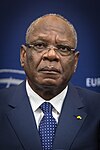
Elections in Mali gives information on election and election results in Mali.

The Alliance for Democracy in Mali – Pan-African Party for Liberty, Solidarity and Justice is a political party in Mali.
The Party for National Rebirth is a Malian political party, created in 1995 by activists from the National Congress for Democratic Initiative (CNID). The Party for National Rebirth is headed by Tiébilé Dramé, who ran for the presidency in 2002, gaining 4% of the votes, coming in fourth place. In February 2007, he was again nominated as the party's presidential candidate for the April 2007 presidential election, receiving third place and 3.04% of the vote.
African Solidarity for Democracy and Independence is a left-wing political party in Mali. It was founded by Cheick Oumar Sissoko and Oumar Mariko in 1996; Sissoko is the party's President and Mariko is its Secretary-General, the top post in the party. The party is Pan-Africanist in ideology, is affiliated internationally with the International Communist Seminar, a grouping organised by the Workers Party of Belgium, and is in part an outgrowth of the 1991 demonstrations against the military rule of President Moussa Traoré. Mariko was head of the Association of Students and Pupils of Mali (AEEM) during the 1991 protest movement which overthrew the government.

A Mauritanian presidential election occurred on 11 March 2007. Since no candidate received a majority of the votes, a second round was held on 25 March between the top two candidates, Sidi Ould Cheikh Abdallahi and Ahmed Ould Daddah. Abdallahi won the second round with about 53% of the vote and took office in April.

A parliamentary election was held in Mali on 1 July 2007 and 22 July. In the first round, there were about 1,400 candidates for 147 seats in the National Assembly.

Parliamentary elections were held in Senegal on 3 June 2007. They had originally been planned to be held together with the presidential election on 25 February 2007, but were postponed. Fourteen parties or coalitions participated in the elections, but they were marked by a major opposition boycott. The ruling Sopi Coalition won 131 seats, including all 90 of the seats elected by majority voting.
Sidibé Aminata Diallo is a Malian academic and politician.
The Rally for Education about Sustainable Development is a political party in Mali. It contested the presidential election on 29 April 2007 with the candidate Sidibé Aminata Diallo, who took seventh place with 0.55% of the vote. Diallo is the first woman to ever contest a presidential election in the country.
The Front for Democracy and the Republic is an opposition coalition in Mali that fought the presidential election on 29 April 2007 and the parliamentary election of 1 July and 22 July 2007. The FDR is an umbrella organisation, bringing together 16 independent political parties and groups. It rejected the official results of the election, according to which incumbent president Amadou Toumani Touré won with about 71% of the vote, and alleged fraud, unsuccessfully asking the Constitutional Court to annul the election. On 19 May, the leading FDR candidate, National Assembly president Ibrahim Boubacar Kéita, said that the group would abide by the court's decision to confirm Touré's victory and would concentrate on the July 2007 parliamentary election.
Oumar Mariko is a Malian politician, doctor and noted former student activist. He is the Secretary-General of African Solidarity for Democracy and Independence (SADI), a left-wing political party, and has three times run for President of Mali, in 2002, 2007 and 2013.
Mamadou Bakary "Blaise" Sangaré is a Malian politician. He is the President of the Social Democratic Convention (CDS-Mogotigiya).

Choguel Kokalla Maïga is a Malian politician and President of the Patriotic Movement for Renewal, a political party in Mali. He served in the government as Minister of Industry and Trade from 2002 to 2007 and later as Minister of the Digital Economy, Information and Communication from 2015 to 2016.
The Malian Party of Labour is a Marxist-Leninist party in Mali and a member of the coalition supporting the Alliance for Democracy in Mali of president Amadou Toumani Touré. Founded in 1965, it was prominent in the student resistance to the 1968-1991 military regime of General Moussa Traoré. It continues as an extra-parliamentary Hoxhaist-Communist faction within the Social-Democratic ADEMA-PASJ coalition, supporters of the Alliance for Democracy and Progress.

Presidential elections were held in Mali on 28 July 2013, with a second round run-off held on 11 August. Ibrahim Boubacar Keïta defeated Soumaïla Cissé in the run-off to become the new President of Mali.

Presidential elections were held in Mali on 29 July 2018. In July 2018, the Constitutional Court approved the nomination of a total of 24 candidates in the election. As no candidate received more than 50% of the vote in the first round, a runoff was held on 12 August 2018 between the top two candidates, incumbent President Ibrahim Boubacar Keïta of the Rally for Mali and Soumaïla Cissé of the Union for the Republic and Democracy. Keïta was subsequently re-elected with 67% of the vote. It was the first time in Malian history that a presidential election was forced into a runoff between incumbent and a challenger.












